- Home
- Cornelia Funke
The Golden Yarn Page 3
The Golden Yarn Read online
Page 3
“Admit it—you got this from one of those crooks who cause more damage to our cultural heritage than all the world’s exhaust fumes combined. Which one? Thistleman? Dechoubrant? If it were up to me. I’d have them all executed—by firing squad. But why don’t you want to sell this crossbow? You’re not sentimental. How is it special?”
Oh, she would have loved the story. The palace of a dead king, the Waterman, the Witch’s clock, the marksmanship of a Goyl...
Jacob zipped the empty backpack. “Let’s just say I’m in its debt.”
Fran’s eyes pierced him as though trying to skewer the truth out of his head, but her fingers were already closing around the crossbow’s handle. Like him, she was a treasure hunter, guardian of a lost past that had left only its traces in gold and silver. Too bad he couldn’t tell her about the bolt that had pierced his chest and saved his life. Or about the two armies destroyed by this one crossbow. Fran would’ve appreciated these stories.
“Fine,” she said. “I’ll have it archived—if you’ll permit me to let our conservators take a closer look.”
“Absolutely. I’d love to know more about its history myself.” And about the smith who could make bowstrings out of glass. But there was probably not much to be learned about the Alderelves in this world, even if one’s laboratory was as good as the Met’s.
“How long shall I keep it for you?”
“One year?”
By then, hopefully, he would have learned how the crossbow could be destroyed. Of course, he didn’t tell Fran about this. He’d already tried fire, explosives, and a saw, but these hadn’t even left a scratch. Only the fire had made the wood a little darker.
***
A museum made it easy to forget which world you were in. But back outside, at the top of the steps, the noise of the Fifth Avenue traffic gave Jacob such an abrupt reminder where he was he found it hard to handle the wave of homesickness washing over him. Not that the streets of Vena or Lutis were any less noisy. It was surprising how much noise horse-drawn carriages and coaches could make. Below him people were crowding the wide sidewalks on their way to bus stops and coffee carts, but in his mind’s eye he saw the castle ruin with the roofs of Schwanstein in the distance. When he spotted Clara at the bottom of the steps, he nearly stumbled into a tourist who was coming up.
Will? Jacob’s heartbeat was set racing by all the worries he’d tried to keep at bay ever since he sent his brother back through the mirror. It was ridiculous how any unusual gesture or expression he’d not seen on his brother’s face before immediately took him back to those moments in the palace in Vena where Will had nearly killed him. But Clara smiled at him reassuringly, and Jacob slowed so that he wouldn’t stumble over his own feet. If this wasn’t about Will, then what was she doing here?
Yes, what, Jacob? Oh, he could be such a fool. Naive like a puppy, he stumbled straight into the trap. But the face at the bottom of the steps was so familiar. It still reminded him of all they’d been through together. His memory’s soft focus had turned even the Larks’ Water into a pleasant anecdote. He noticed she was wearing leather gloves despite the warmth of this summer morning, but he didn’t think too much of it.
“What are you doing in a museum so early in the morning?”
Even the question didn’t raise Jacob’s suspicion. But then she kissed him on the lips.
“Just think of the unicorns,” she whispered to him.
And she pushed him into the oncoming traffic.
Screeching brakes. Horns. Screams. Maybe even his own.
He closed his eyes too late.
Felt a bumper break his arm.
Metal and glass.
The Prince
It was so quiet Jacob assumed he was dead. But then he felt his body. The pain in his arm.
He opened his eyes.
He wasn’t kneeling on pavement, as he would’ve expected, nor lying in his own blood, but on ultramarine-blue wool embellished with silver and woven into such soft thickness as found only in the most precious carpets.
“I apologize for the crude joke. Your brother’s bride as a lure—it was simply irresistible. She has the same grace your mother had, though she does lack a bit of the mystery, doesn’t she? It’s probably what your brother likes about her. He already has too much mystery himself.”
Jacob looked up to find the face for the voice. His neck ached as though someone had tried to break it. A man was sitting in a black leather chair a few feet away. The same chair stood in the museum. The museum in front of which Clara had pushed him into the moving traffic. Department for Modern and Contemporary Art. Get up, Jacob! He couldn’t tell what was making him more nauseous—the collision with the car, or Clara’s blank face as she’d pushed him into the street.
The man was maybe in his late thirties, and he possessed a beauty that seemed strangely old-fashioned. His face would have fit well in a painting by Holbein or Dürer. His suit, however, had been crafted by a modern tailor, as had his shirt. He gave an amused smile as Jacob’s eyes fixed on the tiny ruby in his earlobe.
“Ah, you do remember.”
The voice had been different when they last met in Chicago. Norebo Johann Earlking.
“Rubies.” He touched his ear. “I’ve always had a weakness for them.”
Jacob managed to sit up, though he had to grab a table for balance.
“Is this your real face?”
“Real? A big word. Let’s say it’s closer to my own than the one I showed you in Chicago. The Fairies like to make a secret of their names, and we Alderelves like to hide our true guises.”
“So the name is real?”
“Does it sound real? No. You can call me Spieler...”
He followed Jacob’s glance out the window.
“Fantastic view, isn’t it? We’re barely a stone’s throw from Manhattan. Amazing how easy it is to hide under the mantle of apparent disuse.”
The derelict landscape outside the window stood in stark contrast to the precious furniture. Crumbling buildings drowning in ivy, and the unrestrained growth of a forest battling human construction.
“You mortals place such a touching importance on appearances.” Spieler got up and went to the window. “Animals aren’t fooled as easily. A few decades ago, your lot were almost onto us because some rare heron didn’t want to share this island with us.” He drew on a cigarette he balanced between his slender fingers. Six fingers on each hand, as on all immortals. Spieler blew the smoke toward Jacob, and the narrow room suddenly became as wide as a palace hall, with walls clad in silver and chandeliers made of elven glass. The only object that didn’t change was a marble sculpture of startling beauty. This eliminated Jacob’s final doubt about who he was dealing with. The sculpture was of a tree, and captured in its bark was a face frozen in mid-scream.
“Exile. At first you try to make it bearable by imitating the familiar.” Spieler took another drag from his cigarette. “Yet that gets very monotonous very quickly, and it reminds you too much of all you’ve lost.”
The view from the window disappeared into smoke. The trees vanished, and the water of a river reflected the skyline of a city that seemed strange and still familiar. New York maybe a hundred years ago? No Empire State Building.
“Time. Another thing your kind takes too seriously.” Spieler crushed the cigarette into a silver ashtray, and the hall shrank back into the room where Jacob had awoken, with the same desolate view through the window. “Not foolish, trying to disappear the crossbow into the archives of the museum. After all, how could you have known that Frances Tyrpak is a good friend of mine? Of course, she knows me with a different face. A lot of the Met exhibits were donated by us. But I assume you realize you’re not here because of the crossbow. Or have you forgotten your debt to me?”
Debt...
Jacob thought he could smell forgetyourself, the mythical flower of the Bluebeards. Yes, his worry over the crossbow had made it easy to forget his debt. Together with the desperation that had made him ca
reless enough to engage in such a magical trade. Careless? There wasn’t much choice when you were caught in a Bluebeard’s labyrinth.
“There’s a charming tale from our world about a Stilt who teaches some useless peasant girl how to spin straw into gold,” Spieler continued. “She, of course, tricks him. Even though all he’d asked for was rightfully his.”
Today I bake,
tomorrow brew,
the next I’ll have
the young Queen’s firstborn child.
Jacob had never been too impressed by the Rumpelstiltskin’s threat—his mother had to explain to him what a firstborn was. And even now, he doubted he’d ever have children anyway.
Spieler saw the relief on Jacob’s face and smiled.
“You don’t seem to mind my price. So let me be quite clear: As soon as the vixen puts her first child into your arms, that child is mine. You can take your time with your payment, but pay you will.”
No.
No what, Jacob?
“Why should her first child be mine? We are friends, nothing more.”
Spieler now looked bemused, as though Jacob had tried to tell him the world was a flat disc. “Oh, please! You’re talking to an Elf. I know your most intimate wishes. It’s my business to fulfill them.”
“Name another price. Any other.” Jacob hardly recognized his own voice.
“Why should I? This is my price, and you will pay it. Your vixen will make beautiful children. I hope you don’t take too long.”
How love suddenly tasted of guilt, all wishes of treason. How clear one’s own desires become once they are made impossible. All the nonsense he’d convinced himself of—that he didn’t love her in that way, that his yearning didn’t really mean anything... Lies. He wanted her forever by his side; he wanted to be the only one in her life, the only one who mattered, the only one who’d give her children, the only one who’d see her grow old.
Never, Jacob. Forbidden. He’d sold his future. That he’d sold it to save her life was little consolation.
“Payment is due only in the world where the deal was struck.” It was a pathetic attempt.
“Into which I shall never return lest I want to be turned into a tree? Ah, yes. I’d forgotten about that small detail. But I have to disappoint you again. We shall return. Soon. Some of us, at least.”
The Elf stood by the window.
Get out of here, Jacob.
There were two doors. And then what? If the Elf was to be believed, they were on an island. There were a few islands in the East River, and swimming through those dangerous waters was not a very enticing prospect, especially with a broken arm.
Spieler had his back to Jacob. He was talking about the Fairies, about their vengefulness, about human ingratitude. He seemed to like the sound of his own voice. Who else would listen to him? He’d mentioned others. How many had escaped? Jacob’s eyes were drawn to a mirror leaning against the wall near the sculpture of the Elf frozen into the tree. The mirror was even larger than the one in his father’s study. The frame sprouted the same silver roses, though this one had magpies sitting among the thorny vines.
Spieler was still looking out the window, and the mirror was just a few steps away. Jacob reached it before the Elf could turn. The glass was as warm as an animal, but no matter how hard he pressed his hand over the reflection of his face, the mirror still showed the same room.
Spieler turned around.
“Even your kind can make a sheer endless number of all sorts of mirrors. Do you really believe we are any less inventive?” He went to the desk under the window and leafed through some papers. “Fairy and Alderelf. They once belonged together, like day and night. Did you know that? Our children were mortal, but always exceptional. They would be crowned, declared geniuses, revered as gods. In this world, we can have children with mortal women, but those are often shockingly mediocre.”
Jacob stayed standing in front of the mirror. No matter how hard he tried, he couldn’t turn away from it. It was as though the glass were peeling layers off his soul.
“It’s stealing your face,” he heard Spieler say. “Ironically, it was a mortal who came up with the idea to use our mirrors to create more reliable helpers than your kind seemed able to provide. Show yourself.”
The air in the room grew warmer, and the sunlight coming through the window broke around two figures of mirrored glass. The whole room was reflected in these figures—the white wall, the desk, the chair, the frame of the window. Their bodies became clearer as the faces took on the color of human skin and the reflections turned into clothes. The illusion was perfect, except for the hands. This time the girl wasn’t even wearing gloves: Glassy fingers with silver fingernails rose to touch Clara’s face. The boy by her side looked younger than Will, but who could tell how old they were?
“Just a few weeks old,” Spieler said.
Could the Alderelf read all his thoughts?
“You’ve met Sixteen. Seventeen has even more faces than she does, but I thought it might be useful to give him yours as well.”
Jacob pushed the girl away as she reached out to him. Her brother, if he could be called that, didn’t like it, but Spieler shot him a warning glance, and Seventeen’s body turned reflective again until it was as invisible as polished glass. Sixteen did the same, but only after giving Jacob a parting smile from Clara’s lips.
“It’s an interesting place, that hospital where I stole your brother’s bride’s face. A good place to watch Death at work. Mortality is such a mystery.” Spieler pulled a medallion from his pocket. It contained two mirrors, each the size of a clock face. One was clear, the other much darker. “All I had to do was put the medallion on the table in the nurses’ station. You humans love mirrors. You have to constantly make sure you still have the same face. Nothing scares you more than if someone changes it.”
Spieler changed into the man whom Jacob had met in Chicago. Norebo Johann Earlking. “The stunted growth, the green eyes...Oberon, the Elf whose Dwarf-sized body was the result of a Fairy curse. I admit I had expected you to catch that allusion. The name was so obvious. I stole the face from an actor who played Oberon on stage. I’ve always found it entertaining to play with the images your kind has created of us, and of yourselves.”
The Alderelf’s faces came and went. Some were familiar to Jacob; some weren’t. Until he was suddenly looking at a face that for a long time he’d known only from photographs.
Spieler brushed John Reckless’s graying hair from his forehead. “Your mother never noticed the difference. I was very fond of her. Too much, I have to admit. But I fear that I, like your father, failed to make her happy.”
A Visitor for Clara
Clara first noticed the girl as she was talking to one of the doctors about a child with an inflamed appendix. The face seemed familiar, but she had too much on her mind to pay close attention to the stranger.
Will had not slept again, and he still didn’t want to talk about what was really keeping him awake. He found excuses, for her and for himself. The moon. Something he ate. A book he’d wanted to finish. He tended to hide worries, wishes, or feelings he was ashamed of from himself and others. It had taken Clara a long time to see that. Her invisible Will. So hard to pin down. Sometimes she imagined a locked room deep in his heart, which even he never entered. Except in his sleep.
But it wasn’t just Will. These past weeks she’d felt quite strange herself. As though someone had been inside her head and had taken something away. The feeling was particularly strong when she looked in the mirror in the morning. Sometimes her own face seemed alien to her, or she felt as though her childhood face, or that of her mother, was looking back at her from the misted glass. She’d started to remember things she hadn’t thought about in years. Her entire past life seemed to be coming back to her, as though someone had stirred up the tea leaves of her memories. She had not told Will, of course, or anyone. What could she say? Someone was inside my head and stole something—a ridiculous diagnosis for a would
-be doctor.
Still, she’d been tempted to talk to Jacob about it. It was silly how much she looked forward to seeing him. She tried to tell herself it wasn’t Jacob she missed, but the life he lived and the world he lived in, but it was no good. It pained her that she couldn’t hear enough of the stories Jacob and Fox told her and Will. Didn’t she do everything to avoid reminding Will of the other world? Hadn’t she wished the mirror to hell a thousand times over? And yet far too often she caught herself sneaking into that dusty room when Will was out, staring into the glass as though it could show her the world waiting on the other side like a forbidden fruit. Did Will feel the same? If he did, he didn’t show it.
Clara was sitting at the nurses’ station, finishing some charts the doctors would need the next morning, when the girl she’d noticed before was suddenly standing right in front of her. Clara hadn’t even heard her approach.
“Clara Ferber?” The girl smiled. Clara noticed she was wearing gloves, even though it was a hot day. They were made of pale yellow leather. “I’m to give this to you. From an admirer.”
The girl took a box from her bag. She opened it before offering it to Clara. On a bed of silver fabric lay a brooch in the shape of a moth, the wings fashioned from black lacquer. Clara had never seen a more beautiful thing. Before she knew it, she was holding the brooch in her hand. She could barely resist the temptation to pin it to her scrubs.
“What admirer?” she asked. Will would never buy her anything so expensive. They barely had enough money for their apartment. Will’s mother had left it to her sons, but with a hefty unpaid mortgage.
The pin pricked her finger as she returned the brooch to its box. “I cannot accept this.”
“Clara.” The girl pronounced the name as though she was savoring its sound on her tongue. How did she know Clara’s name? Of course. The name tag on her scrubs.
The girl took the brooch and, despite Clara’s protests, pinned it on her. “I wish I had a name,” she said. “Sixteen. But that’s just for those who came before me.”

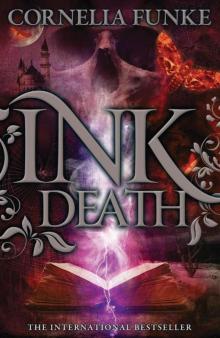 Inkdeath
Inkdeath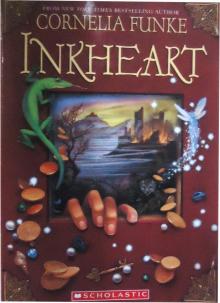 Inkheart
Inkheart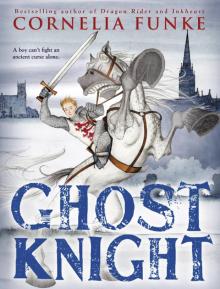 Ghost Knight
Ghost Knight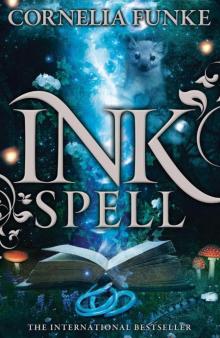 Inkspell
Inkspell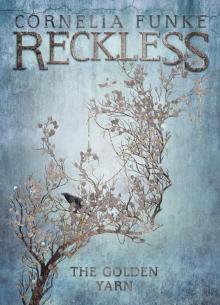 The Golden Yarn
The Golden Yarn Fearless
Fearless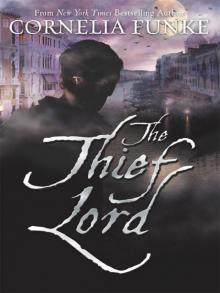 The Thief Lord
The Thief Lord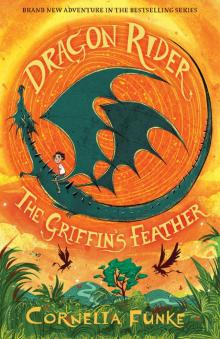 The Griffin's Feather
The Griffin's Feather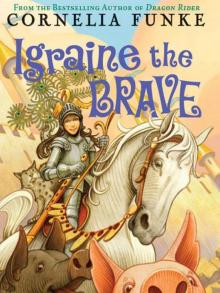 Igraine the Brave
Igraine the Brave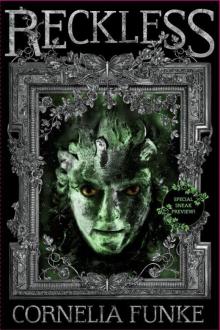 Reckless
Reckless When Santa Fell to Earth
When Santa Fell to Earth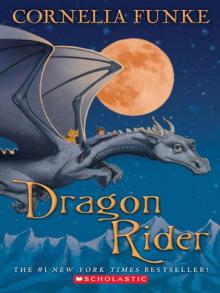 Dragon Rider
Dragon Rider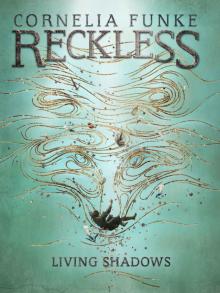 Living Shadows
Living Shadows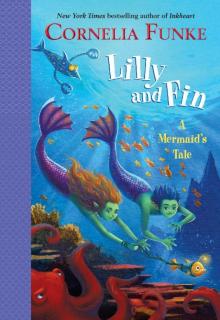 Lilly and Fin: A Mermaid's Tale
Lilly and Fin: A Mermaid's Tale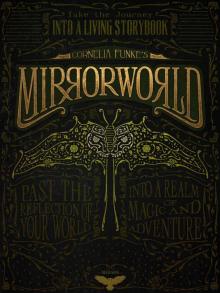 The MirrorWorld Anthology
The MirrorWorld Anthology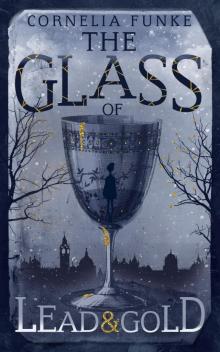 The Glass of Lead and Gold
The Glass of Lead and Gold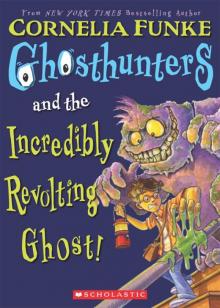 Ghosthunters and the Incredibly Revolting Ghost
Ghosthunters and the Incredibly Revolting Ghost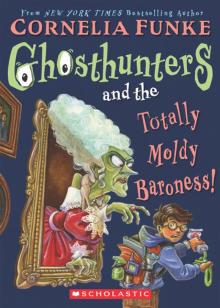 Ghosthunters and the Totally Moldy Baroness!
Ghosthunters and the Totally Moldy Baroness!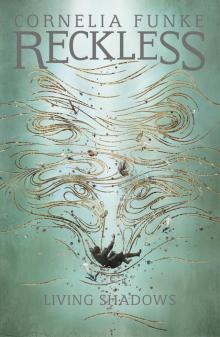 Reckless II
Reckless II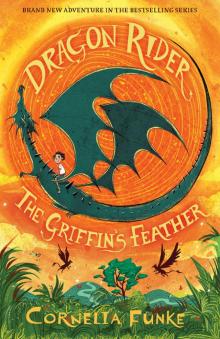 Griffin's Feather
Griffin's Feather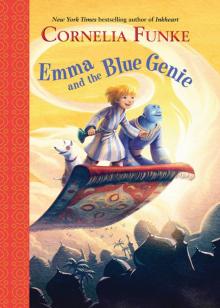 Emma and the Blue Genie
Emma and the Blue Genie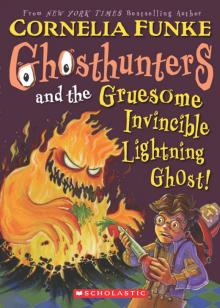 Ghosthunters and the Gruesome Invincible Lightning Ghost
Ghosthunters and the Gruesome Invincible Lightning Ghost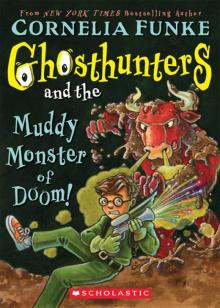 Ghosthunters and the Muddy Monster of Doom!
Ghosthunters and the Muddy Monster of Doom!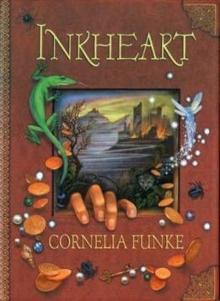 Inkheart ti-1
Inkheart ti-1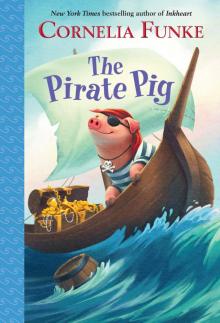 The Pirate Pig
The Pirate Pig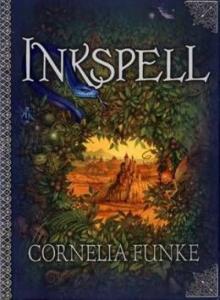 Inkspell ti-2
Inkspell ti-2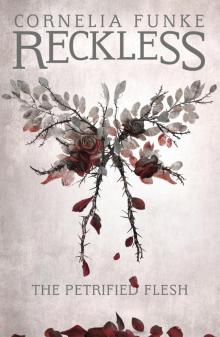 The Petrified Flesh
The Petrified Flesh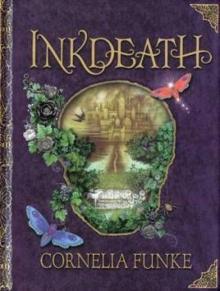 Inkdeath ti-3
Inkdeath ti-3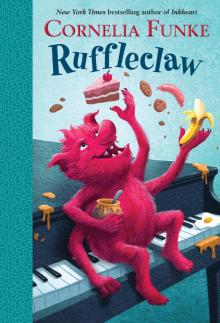 Ruffleclaw
Ruffleclaw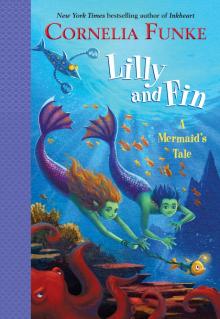 Lilly and Fin
Lilly and Fin